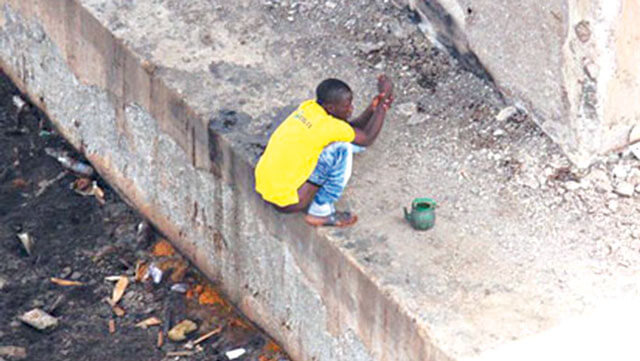Open markets are prone to abuse and this is because some people inhabit in the place after trading has ended and sellers return home with their goods.
It is easy to find faeces littering many areas in open markets which sellers have to contend with before resuming trading the next day.
Advertisement
Open defecation in some public places such as markets, high ways, public classrooms, bushes, under the bridge, rail way track is incredibly dangerous, as exposure to human waste causes diarrhoea and other diseases that can be deadly, especially for children.
Despite efforts by stakeholders in pushing for the use of toilets, 47 Million Nigerians still defecate openly.
A field trip organised recently by the United Nations Children’s Fund, UNICEF, with support from European Union and UKaid to one of the markets in Ibadan, Idi Osan, located along the Ogbere Road in Ona Ara Local Government Area of Oyo State, it was observed that the market which is on its way to be certified Open Defecation Free, has no functional water system encouraging traders to defecate openly or use the abandoned old pit latrine around the Idi Osan foodstuff market
The food stuff sold in this market could become veritable tools of contamination especially as traders who handle them either use toilets and do not wash their hands thereafter or after open defecation and due to unavailability of water, do not practice hand washing.
Advertisement
According to one of the traders who spoke to our correspondent, Maimunat Ibrahim, lamented that fetching water from the community was a big challenge for her, “first of all, I have five grandchildren, plus me, making the total number six. If we have to go to the toilet once per day, I will be paying N120 per day. Even if I can afford that, fetching water from the community to flush the toilet is cumbersome.
“So, some of us have resorted to open defecation. What we do is that we know when the environmental sanitation officers come to the market for inspection. During the time they don’t come, we defecate in our potty and when it is getting dark, we look for ways to throw it away
“The water has not been working for more than a year now. The committee said we should gather money to repair the water,” Maimunat revealed.
Also, according to Chief Tajudeen Adedoyin, 72 years, who deals on whole sale beer for 10 years now said, sometimes the traders use the old pit toilet.
Adedoyin added that, “there is hardly any water around except you go into the community, so sometimes, we use the old latrine especially when we can’t get access to water.”
Advertisement
According to Saidatu Akanni, a cassava flour seller said, “We have now returned to making use of the old pit latrine where we do not pay unlike the new water toilet where we now pay N20.”
The deputy Iyaloja, Madam Deborah Afolabi, who has been in the market for 20 years said “a committee was set up to ensure the maintenance of the newly built improved toilet at that time. We were collecting N50 for using the toilet, people were not paying and they complain that it is so expensive.
“So they started using the old pit latrine or elsewhere. The new toilet price was reduced to N20. The government is aware that the borehole is bad for like two years. A new pumping machine is about N70,000 and the leadership cannot afford to replace it.
From findings, the traders lamented that after carrying out their daily routine of buying and selling their products, they are not always comfortable when they want to use the toilet because of the inconveniences that comes with it.
According to Sanitarian Rashedat Popoola, “our duty as Sanitation officials of the Ona Ara local government is to regularly visit the market and liaise with the leaders to ensure the market environment is clean and safe for all patrons and sellers”.
On the faulty pumping machine, Popoola said that the information was not brought to her notice before the field visit and promised to notify the local authority for repairs.
Advertisement
According to the United Nations Children’s Fund, Water and Sanitation, Specialist, Mr. Bioye Ogunjobi, during a two-day Media Dialogue on Clean Nigeria: Use The Toilet Campaign in Ibadan, noting that many organised public spaces like schools and markets do not have good or clean toilet facilities for use of pupils and traders prompting open defecation.
Ogunjobi said, only 12 out of every hundred markets in the country have facilities for water, sanitation and health hence, open defecation in markets is not unexpected.
Nigeria needs not less than two million toilets annually between 2019 and 2025 to achieve the target of universal poor sanitation.
Nigeria’s current delivery of improved toilet is approximately 160,000 per year, stating that poor hygiene and water are responsible for the frequent episodes of diarrhoea and other water related diseases.
Ogunjobi said over 100,000 children under age five die yearly due to diarrhoea of which 90 percent is directly attributed to unsafe water and sanitation.
The practice of open defecation has an economic, social and health impact on National development as Nigeria loses about N1.3 percent (N455 billion) of her GDP annually to poor sanitation and a third of that cost is as a result of open defecation.
According to the WASH NORM report, one in four Nigerians defecates in the open, while one in two persons in the North Central defecates in the open. Out of the 47 million practising Open Defecation in Nigeria, 16 million are from the North Central.



